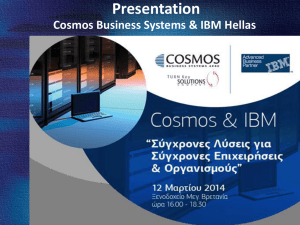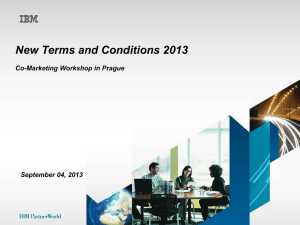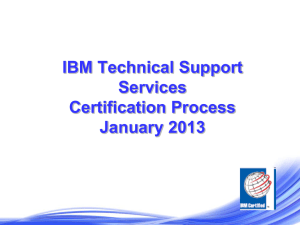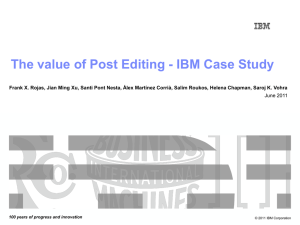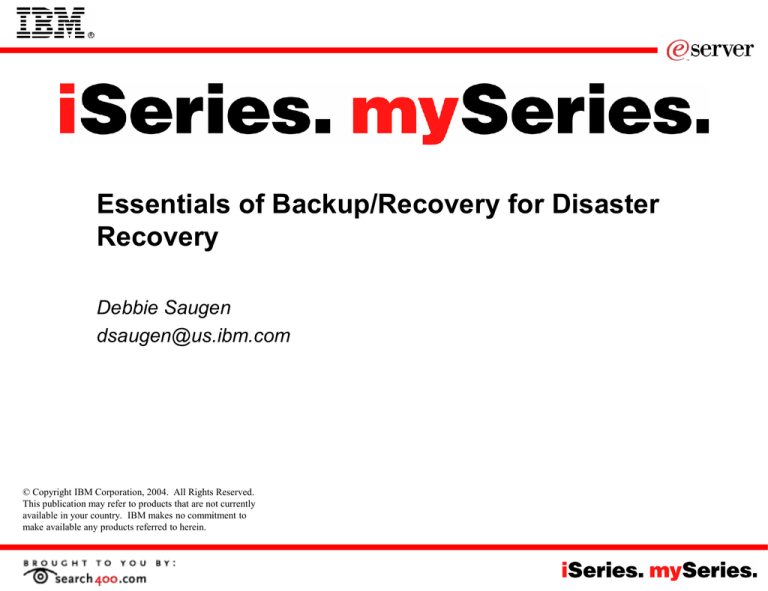
Essentials of Backup/Recovery for Disaster
Recovery
Debbie Saugen
dsaugen@us.ibm.com
© Copyright IBM Corporation, 2004. All Rights Reserved.
This publication may refer to products that are not currently
available in your country. IBM makes no commitment to
make available any products referred to herein.
Agenda
• Backup Basics
– Backing Up the Entire System
– Backing Up System Data
– Backing Up User Data
• Unattended Operations With Save Menu Options
• Backup Recovery and Media Services
• Disaster Recovery Tips
• Rapid Recovery
© 2004 IBM Corporation
Golden Rules for Backup/Recovery
• That Which Has Not Been Backed up Cannot be Recovered
• That Which Has Not Been Backed up Offsite Will Not Survive a Disaster
• Any Backup That Has Not Been Tested With a Recovery is Not a Backup
• Back It Up or Give It Up
© 2004 IBM Corporation
Save Commands and Menu Options
Options from
Save menu
Commands
Licensed Internal Code
OS/400 Objects in QSYS
SAVSYS
22
User Profiles
Private Authorities
SAVSECDTA
23
Configuration Objects
IBM-supplied Directories
21
OS/400 Optional Libraries
QHLPSYS
QUSRTOOL
Licensed Program Libraries
QRPG
QCBL
Qxxxxx
SAVCFG
SAV
SAVLIB
*IBM
SAVLIB
*NONSYS
IBM Libraries with User Data
QGPL QUSRSYS QS36F #LIBRARY
User Libraries
LIBA
LIBB
LIBC
SAVLIB
*ALLUSR
LIBxxx
23
Documents and Folders
Distribution Objects
User Objects in Directories
© 2004 IBM Corporation
SAVDLO
SAV
Save Menu Options 21, 22, 23
Save
Select one of the following:
Save system and user data
Option 20. Define save system and user data defaults
Option 21. Entire system
Option 22. System data only
Option 23. All user data
© 2004 IBM Corporation
Save Menu Option 21
• Entire System - Runs Commands:
– ENDSBS SBS(*ALL) OPTION(*IMMED)
– CHGMSGQ QSYSOPR DLVRY(*BREAK or *NOTIFY)
– SAVSYS
– SAVLIB LIB(*NONSYS) ACCPTH(*YES)
– SAVDLO DLO(*ALL) SAVFLR(*ANY)
– SAV DEV('/QSYS.LIB/tape-device-name.DEVD')
OBJ(('/*') ('/QSYS.LIB' *OMIT) ('/QDLS' *OMIT))
UPDHST(*YES)
– STRSBS SBSD (controlling-subsystem)
© 2004 IBM Corporation
Save Menu Option 22
• System Data Only - Runs Commands:
– ENDSBS SBS(*ALL) OPTION(*IMMED)
– CHGMSGQ QSYSOPR DLVRY(*BREAK or *NOTIFY)
– SAVSYS
– SAVLIB LIB(*IBM) ACCPTH(*YES)
– SAV DEV('/QSYS.LIB/tape-device-name.DEVD')
OBJ(('/QIBM/ProdData') ('/QOpenSys/QIBM/ProdData'))
UPDHST(*YES)
– STRSBS SBSD (controlling-subsystem)
© 2004 IBM Corporation
Save Menu Option 23
• All User Data - Runs Commands:
– ENDSBS SBS(*ALL) OPTION(*IMMED)
– CHGMSGQ QSYSOPR DLVRY(*BREAK or *NOTIFY)
– SAVSECDTA
– SAVCFG
– SAVLIB LIB(*ALLUSR) ACCPTH(*YES)
– SAVDLO DLO(*ALL) FLR(*ANY)
– SAV DEV('/QSYS.LIB/tape-device-name.DEVD')
OBJ(('/*) ('/QSYS.LIB *OMIT) ('/QDLS *OMIT)
('/QIBM/ProdData' *OMIT) ('/QOpenSys/QIBM/ProdData' *OMIT))
UPDHST(*YES)
– STRSBS SBSD (controlling-subsystem)
© 2004 IBM Corporation
Simple Backup Strategy
• Simple Backup Strategy
– Perform Entire System Saves Using Menu
– Option 21
• Daily for Simple Backup Strategy
• Simplifies System Recoveries
© 2004 IBM Corporation
Medium Backup Strategy
• Medium Backup Strategy
– Perform Saves of System Data Only Using
– Menu Option 22 After Installing:
• New Release
• PTFs
• Licensed Program Products
– Perform Saves of All User Data
• Daily for Medium Backup Strategy
© 2004 IBM Corporation
Complex Backup Strategy
• Complex Backup Strategy
– Customized CL Programs or BRMS
– Saving Changed Objects
– Saving Journals & Receivers
– Save-while-active Function
– Replicated Systems for 24X7 Strategy
© 2004 IBM Corporation
Hardware Managment Console (HMC)
• Required on i5 Hardware for partitioned or Capacity on Demand systems
• Backed up separately outside Save Option 21 for Recovery
• Backup performed on HMC Console to DVD/RAM
© 2004 IBM Corporation
Unattended Operations With Save Menu Options
© 2004 IBM Corporation
Unattended Saves Using Save Menu Options
•
Unattended Save Using Start Time
Parameter
– Option 21 - Save Entire System
– Option 22 - Save System Data
– Option 23 - Save User Data
Specify Command Defaults
Type choices, press Enter.
Tape devices . . . . . . . . . . .
Prompt for commands . . . . . . .
Check for active files . . . . . .
Message queue delivery . . . . . .
Start time . . . . . . . . . . . .
Vary off network servers . . . . .
Names
Y=Yes, N=No
Y=Yes, N=No
*BREAK, *NOTIFY
*CURRENT, time
*ALL, *NONE, *WINDOWSNT,
*GUEST (V5R3)
Type choices, press Enter.
Unmount file systems . . . . .
Y
Y=Yes, N=No (V5R3)
Print system information . . .
N
Y=Yes, N=No (V4R2)
F3=Exit F12=Cancel
© 2004 IBM Corporation
TAP01___
________
________
________
N
N
*NOTIFY
22:00:00
*ALL
________
Unattended Save
• Requires Dedicated Workstation (Console)
– Potential Security Exposure
• SysReq 2 (Endjob) While Waiting
• User Profile usually has higher security class
– V4R2 and Higher:
• Option to vary off network servers before saving
• Option to unmount user-defined file systems before saving
• Option to print system information
– V5R3 Enhancements
• Vary off network servers default of *ALL
• Unmount user-defined file systems default of Yes
© 2004 IBM Corporation
Save Menu Options Defaults
• Save Menu Options Defaults
– Save Menu Option 20
• Define Save System and User Data Defaults
– Simplifies Unattended Saves
– Define Defaults For:
• Save Option 21 - Entire system
• Save Option 22 - System data only
• Save Option 23 - All user data
© 2004 IBM Corporation
Save Menu Options Defaults
Define Save System and User Data Defaults
Save
Select one of the following:
Save system and user data
Option 20.Define Save system and user data defaults
Option 21.Save entire system
Option 22.System data only
Option 23.All user data
© 2004 IBM Corporation
Save Menu Options Defaults
Define Save System and User Data Defaults
Type choices, press Enter.
Tape devices . . . . . . . . . . .
Prompt for commands . . . . . . .
Check for active files . . . . . .
Message queue delivery . . . . . .
Start time . . . . . . . . . . . .
Vary off network servers . . . . .
Type choices, press Enter.Y
Unmount file systems . . . . .
Print system information . . .
Use system reply list. . . . .
F3=Exit F12=Cancel
© 2004 IBM Corporation
TAP01___
________
________
________
N
N
*NOTIFY
22:00:00
*ALL
Names
Y
N
N
Y=Yes, N=No (V5R3)
Y=Yes, N=No (V4R2)
Y=Yes, N-No (V4R3)
Y=Yes, N=No
Y=Yes, N=No
*BREAK, *NOTIFY
*CURRENT, time
*ALL,*NONE,*WINDOWSNT,
*GUEST (V5R3)
Backup Recovery and Media Services
© 2004 IBM Corporation
Product Characteristics
• Key Features
– Controls Backup
• Enabler for backup strategies
– Guides Recovery al All Levels
– Archives Data from DASD to Tape
• Dynamic retrieval for archived files
– Classifies, Tracks, and Protects Tape Media
– Single-system or Multi-system Environment
• Licensed Program product 5716BR1, 5763BR1, 5769BR1 and 5722BR1
– Runs on all i5, iSeries and AS/400 models
– Supports all i5, iSeries and AS/400 tape devices and tape media
– Significant step beyond operational assistant backup
© 2004 IBM Corporation
Backup and Recovery Information
© 2004 IBM Corporation
Backup and Recovery Information
• Read the book EVERY time a new release comes out?
– You MUST use the correct version of the book with each new release!
• ARE YOU SAVING THE RIGHT STUFF poster
– New UPDATED Poster for V5R2 (Includes BRMS - G325-6328-03)
• iSeries Backup and Recover Learning Guide (Search400.com)
-- http://search400.techtarget.com/originalContent/0,289142,sid3_gci951628,00.html
• Starter Kit for IBM iSeries and AS/400 (www.iseriesnetwork.com)
– iSeries Backup Basics & BRMS Chapters
– New Updated Edition
• iSeries NEWS Magazine Backup/Recovery FAQS
– Commonly asked Backup/Recovery Questions and Answers
– www.iseriesnetwork.com
© 2004 IBM Corporation
Backup and Recovery Book
•
•
•
•
Hardcopy No Longer Shipped Free
Fee Charge for Book
Hardcopy Critical for DASD Configuration and Recoveries
Ensure YES on Configurator for Hardcopy
© 2004 IBM Corporation
New Backup and Recovery Information
• Comprehensive Backup Information Moved to Information Center http://www.iseries.ibm.com/infocenter (V5R1 and Higher)
– Planning a backup and recovery strategy
– Getting your media ready to save your system
– Before you save anything
– Saving your system with the GO SAVE command
– Manually saving parts of your system
– Saving your system under time limitations
– Setting up disk protection for your data
– Controlling system shutdown using a power-handling program
© 2004 IBM Corporation
New Backup and Recovery Information
• Backup and Recovery Book - Starting with V4R5
– New Step by Step Restore Instructions when Recovering Your Server to the
Same Server - See Appendix G (V4R5/V5R1) Appendix D (V5R2) Appendix
C (V5R3)
– New Steps for Moving Previous Release User Data to a System at a Higher
Release in Chapter 15, " Release to Release Support"
• Backup and Recovery Book - Starting with V5R2
– New Step by Step Restore Instructions when Recovering Your Server to a
Different Server - See Appendix E (V5R2) Appendix D (V5R3)
© 2004 IBM Corporation
Testing, Testing and More Testing!!
• Testing Your Recovery Strategy Ensures You Have a Good Backup Strategy!!
– Your Backups are only as Good as Your Recovery
– Only True Backup Verification is Done by Testing Your Recovery
– Recovery Strategy only as Good as Backup Strategy
– Design Recovery Strategy Before Backup Strategy
© 2004 IBM Corporation
Prevent Disasters Before Test!
• Don't forget keys to vital records boxes
• Know your password
– Keep passwords current
• Arrange for serial number dependent software
• Use PRTSYSINF Command or option on Save
Menus 21, 22 and 23 (V4R2 or later) to print
important system information
• Ensure RSTLIB and CHGPWD commands NOT
changed to use different programs
© 2004 IBM Corporation
Prevent Disasters Before Test!
• Tape Management
– Ensure tapes are labeled or cataloged with unique volume IDs (Tape
Management Product such as BRMS)
– Prevent overwriting tapes with active data (tape management product such
as BRMS)
– Have at least two sets
– Use error reports to remove bad tapes from
inventory
– Audit tapes for data integrity
– Do NOT IGNORE tape drive problems!
© 2004 IBM Corporation
Prevent Disasters Before Test!
•
Ensure Critical Data is Completely Backed Up!!
– Completely back up Library QUSRSYS
– #1 recovery problem today!!
– Objects starting with Q in QUSRSYS contain critical recovery data
• To Save Everything in QUSRSYS:
– End all subsystems (with ENDSBS SBS(*ALL))
– Ensure subsystems QSNADS, QSYSWRK,
QSERVER ended & ENDTCPSVR *MGTC
– Use Save menu option 21 or 23
– Use the save-while-active feature
© 2004 IBM Corporation
Prevent Disasters Before Test!
•
ALWAYS Save Access Paths!
– Default on Save Menu Options (21, 22, 23) is YES to Save Access Paths
– Default on BRMS is YES to Save Access Paths
• BEWARE!!
– Prior to V5R3 Default for Saving Access Paths on
Save Commands is NO
© 2004 IBM Corporation
Saving Access Paths - New Default for V5R3
•
New Save Access Paths Default for Save Commands
– *SYSVAL
– New System Value QSAVACCPTH
• '1' Save Access Paths (Default)
• '2' Do Not Save Access Paths
– Supported on SAVLIB, SAVOBJ, SAVCHGOBJ, SAVRSTLIB, SAVRSTOBJ,
SAVRSTCHG
• *YES or *NO Still Valid Options
© 2004 IBM Corporation
Prevent Disasters Before Test!
•
Install Latest Backup/Recovery Group PTF
– V4R1M0 - SF99073
– V4R2M0 - SF99074
– V4R3M0 - SF99075
– V4R4M0 - SF99076
– V4R5M0 - SF99077
– V5R1M0 - SF99078
– V5R2M0 - SF99085
– V5R3M0 - SF00185
• DSPDTAARA SFxxxxx for Date
of Group PTF (V5R1 or Prior)
• WRKPTFGRP SFxxxxx for Date
of Group PTF (V5R2 or Higher)
© 2004 IBM Corporation
Recovering with Alternate Installation Device
• Allows Setup of Alternate Installation Device for Alternate IPL
• REQUIRED for FIBRE CHANNEL TAPE DEVICES!
• Define Via Dedicated Service Tools (DST)
NOTE: Alternate Installation Device REQUIRES PID Install CD for Installs and
System Recoveries from Tape Media
© 2004 IBM Corporation
Prevent Disasters During Test!
•
During Install/Restore
– On RISC, Install Licensed Internal Code using option 2 - Install Licensed
Internal Code and Initialize system (unless system pre-configured and
instructed to select option 3 to Recover Configuration)
– Enter the Correct Date
– Enter Correct System Time Zone (New for V5R3)
© 2004 IBM Corporation
Prevent Disasters During Test!
• System Values Settings Required Recovery
– System value QALWOBJRST must be *ALL
– System value QJOBMSGQFL must be *PRTWRAP
– System value QVFYOBJRST must be 1 (V5R1 and higher)
• Security Sensitive System Value Changes Not Allowed
– DST Option in V5R2
– Default is to Allow Changes
– If Disallowed, Must Update in DST to Allow Changes During Recovery
© 2004 IBM Corporation
Prevent Disasters During Test!
• Recovering to a Different System (Different Serial Number)
– Must specify ALWOBJDIF(*ALL) on all RSTxxx Commands - MBROPT(*ALL)
on RSTLIB Command
Note: ALWOBJDIF(*ALL) during System Recovery to a Different System
Links Authorization Lists to the Objects
– Must specify SRM(*NONE) on RSTCFG command
© 2004 IBM Corporation
Prevent Disasters During Test!
•
Security Issues During Recovery
– After Restore, Unsure of QSECOFR Password? Not sure if password has
Expired?
• Change Password (CHGUSRPRF command) before signing off
– Know Other User IDs needed for Test
© 2004 IBM Corporation
Prevent Disasters During Test!
• Security Issues During Recovery
• Authorization lists securing objects in QSYS:
– Association between object and authorization list lost during restore because
QSYS restored prior to user profiles
– Need program to produce a file of these objects and include file in the save
(See An Implementation Guide for AS/400 Security and Auditing, for sample
programs (ALLAUTL and FIXAUTL))
© 2004 IBM Corporation
Prevent Disasters During Test!
• Need only Critical Application Data restored?
– You MUST restore libraries QSYS2, QGPL and QUSRSYS
NOTE: Starting with V5R2 QSYS2 is part of *ALLUSR
Saved with *IBM Save Previously
– SAVLIB/RSTLIB of *NONSYS or *ALLUSR in V5R3
Saves and Restores QSYS2, QGPL and QUSRSYS First
• If you use journaling, the libraries containing the journals must be restored before
restoring the journaled files
© 2004 IBM Corporation
Prevent Disasters During Test!
• If you have logical files whose based-on files are in a different library, you must
restore all based-on files before you can restore the logical file
• Message CPF3204 "Cannot find object needed for file xxxx in xxx" During
Recovery
– If RSTLIB(*NONSYS) Performed, Run the Following Command to Restore
Logical Files
RSTLIB SAVLIB(*NONSYS) DEV(media-device-name) OPTION(*NEW)
MBROPT(*ALL) ALWOBJDIF(*ALL)
– Otherwise, Run the Following Command for each Logical File that Needs to
be Restored
RSTOBJ OBJ(logical-file-name) SAVLIB(library-name) DEV(media-devicename) OBJTYPE(*FILE) MBROPT(*ALL) ALWOBJDIF (*ALL)
© 2004 IBM Corporation
How do I Get Started on a Disaster Recovery Plan?
• Appendix B - Backup and Recovery Book
• Example Disaster Recovery Plan
© 2004 IBM Corporation
Rapid Recovery for iSeries and AS/400 Replication
© 2004 IBM Corporation
iSeries and AS/400 Replication
. . .a Rapid Recovery feature that enables you to
replicate your applications and data.
• Can achieve recovery time objectives of minutes
• Protects data to last replicated transaction
IBM Site
Hotsite
Customer
Customer
© 2004 IBM Corporation
iSeries and AS/400 Replication Options
You can replicate all or part
of your system to a target
system at either hotsite or
one of your sites.
Customer Site
Customer Site
Customer Site(s)
Customer(s)
Hotsite
Partitioning
Hotsite or Customer
Site
Or you can replicate all or part of
your system to a partition on a
target system at a hotsite.
This solution enables sharing of
resources and achieves a new
price point for replication.
© 2004 IBM Corporation
Remember.....Test Your Recovery!!!
The Only Way to Ensure you have a Good Backup Strategy is
to Test your Recovery!!!!
© 2004 IBM Corporation
Trademarks and Disclaimers
© IBM Corporation 1994-2004. All rights reserved.
References in this document to IBM products or services do not imply that IBM intends to make them available in every country.
The following terms are trademarks of International Business Machines Corporation in the United States, other countries, or both:
AS/400
e-business on demand
AS/400e
IBM
BRMS
eServer
IBM (logo)
TSM
iSeries
OS/400
Rational is a trademark of International Business Machines Corporation and Rational Software Corporation in the United States, other countries, or both.
Java and all Java-based trademarks are trademarks of Sun Microsystems, Inc. in the United States, other countries, or both.
Microsoft, Windows, Windows NT, and the Windows logo are trademarks of Microsoft Corporation in the United States, other countries, or both.
Intel, Intel Inside (logos), MMX and Pentium are trademarks of Intel Corporation in the United States, other countries, or both.
UNIX is a registered trademark of The Open Group in the United States and other countries.
SET and the SET Logo are trademarks owned by SET Secure Electronic Transaction LLC.
Other company, product or service names may be trademarks or service marks of others.
Information is provided "AS IS" without warranty of any kind.
All customer examples described are presented as illustrations of how those customers have used IBM products and the results they may have achieved. Actual
environmental costs and performance characteristics may vary by customer.
Information concerning non-IBM products was obtained from a supplier of these products, published announcement material, or other publicly available sources and does
not constitute an endorsement of such products by IBM. Sources for non-IBM list prices and performance numbers are taken from publicly available information,
including vendor announcements and vendor worldwide homepages. IBM has not tested these products and cannot confirm the accuracy of performance, capability, or
any other claims related to non-IBM products. Questions on the capability of non-IBM products should be addressed to the supplier of those products.
All statements regarding IBM future direction and intent are subject to change or withdrawal without notice, and represent goals and objectives only. Contact your local
IBM office or IBM authorized reseller for the full text of the specific Statement of Direction.
Some information addresses anticipated future capabilities. Such information is not intended as a definitive statement of a commitment to specific levels of performance,
function or delivery schedules with respect to any future products. Such commitments are only made in IBM product announcements. The information is presented here
to communicate IBM's current investment and development activities as a good faith effort to help with our customers' future planning.
Performance is based on measurements and projections using standard IBM benchmarks in a controlled environment. The actual throughput or performance that any
user will experience will vary depending upon considerations such as the amount of multiprogramming in the user's job stream, the I/O configuration, the storage
configuration, and the workload processed. Therefore, no assurance can be given that an individual user will achieve throughput or performance improvements
equivalent to the ratios stated here.
Photographs shown are of engineering prototypes. Changes may be incorporated in production models.
© 2004 IBM Corporation



